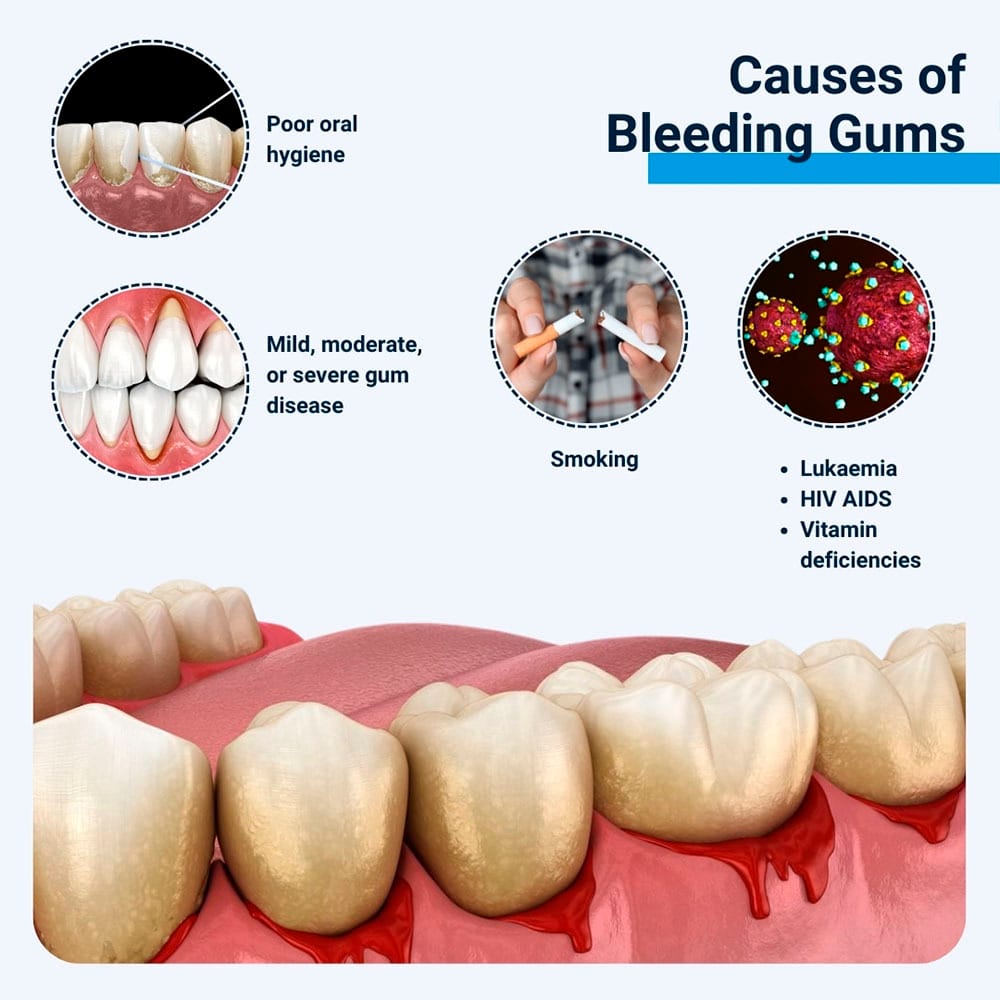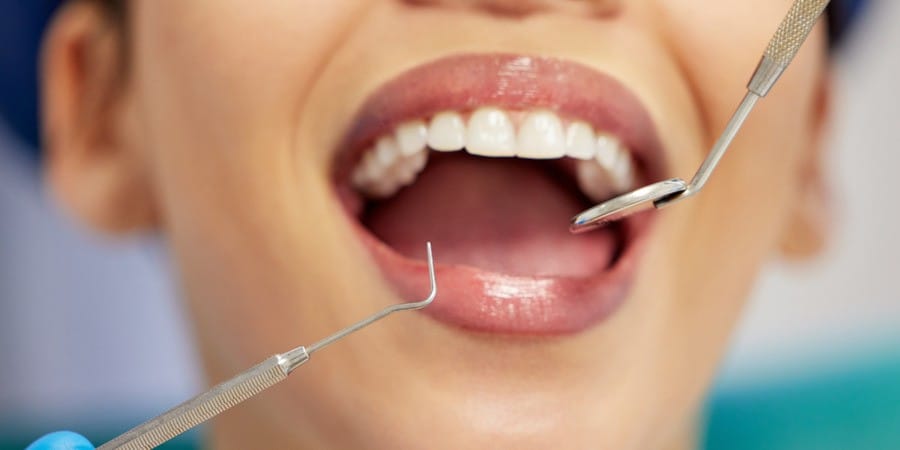What Can Cause Bleeding Gums?
You may develop bleeding gums for many reasons, including the following.
Poor Oral Hygiene
Poor oral care allows plaque and tartar to build up. These contain bacteria that can infect and inflame your gums.
Gum Disease
Gum disease is a bacterial infection that often results from poor oral care. Some people may be more at risk of gum disease if they have problems affecting their immune system.
Smoking
Smokers are more likely to develop gum disease compared to non-smokers. This is because nicotine constricts the blood vessels, so your body cannot transport nutrients to help your gums fight infection and carry away harmful toxins.
Vitamin Deficiencies
You may develop bleeding gums if your diet lacks certain vitamins, especially vitamins C and K.
Brushing Your Teeth Too Hard
Scrubbing your teeth very hard, especially if you use a hard bristled toothbrush, can cause them to bleed. It’s better to use a soft-bristled toothbrush and gentle pressure.
Certain Medications
Some medications can increase the risk of leading gums, especially blood thinning medicines.
Hormonal Changes
Hormonal changes increase the gum’s sensitivity to the bacteria that cause gum disease. As a result, gums are more likely to become inflamed and fragile and bleed easily.
Certain Medical Conditions
Some medical conditions can increase the risk of bleeding gums. These include leukemia, pernicious anemia, diabetes, HIV, AIDS, and oral herpes.

What Are the Signs to Look out for?
In addition to gums that bleed easily, you may notice some of the following symptoms.
- Swollen, tender gums that can look red or purple.
- Bad breath.
- Loose teeth or changes to your bite.
- Gum recession is exposing your tooth roots so your teeth look longer.
Why You Shouldn’t Ignore Bleeding Gums
Initially, it may not seem serious if your gums bleed, but it’s important not to ignore this symptom.
Often, bleeding gums is a sign of gum disease.
When we treat this condition early, it is entirely reversible. However, without prompt treatment, it can progress into periodontitis, a potentially chronic condition that requires ongoing care to control.
Periodontitis increases the risk of tooth loss, destroying the bone around your teeth and affecting your overall health. It’s been linked to systemic health issues like heart disease and diabetes.
Diagnosing the Cause of Bleeding Gums
If you have noticed blood on your toothbrush or bathroom sink or are concerned about your gum health, schedule an appointment with our experienced dentists or our periodontist, Dr. Richard Nejat.
We can examine your gums and will ask about your medical health to determine the cause. Digital dental X-rays will allow us to evaluate any damage to the gum and bone around your teeth and to plan suitable treatment.
Treatment Options for Bleeding Gums
The treatment options we may recommend will depend on the cause. Sometimes, treatment can be straightforward and quick.
Possible solutions are outlined below.
Professional Dental Cleaning
Early gum disease, called gingivitis, can be treated with a professional dental cleaning. Our hygiene team will clean your teeth thoroughly, removing all plaque and tartar buildup. This eliminates the bacteria causing the infection so your gums can begin to heal.
Improved Oral Care Routine
We can provide expert advice on your oral care routine tailored to your needs. Our recommendations may include using better techniques to brush and floss your teeth thoroughly or ensuring you do not brush your teeth too hard.
Antimicrobial Mouthwash and Medications
It might be useful to begin using an antimicrobial mouthwash that helps control plaque bacteria. We can recommend a suitable brand if we think it will help improve your oral health.
Our dentist may also prescribe antibiotics or other medications to help fight and control gum disease.
Teeth Scaling and Root Planing
If you have moderate gum disease we may recommend a teeth scaling and root planing treatment to deep clean your teeth and gums. This may be necessary if your gums have begun to recede and where we need to clean out the spaces between your teeth and gums, called periodontal pockets.
Our dentist or periodontist may recommend a course of treatments to help restore gum health or control chronic periodontitis.
Osseous or Gum Surgery
Advanced gum disease may require osseous or gum surgery. This is designed to reduce the size of periodontal pockets around your teeth, enabling them to begin to fit more snugly around your teeth.
Laser Dentistry
Clock Tower Dental has an advanced dental laser that can effectively treat gum disease. The laser energy helps destroy harmful bacteria and sterilize areas that are treated.
Dietary Advice
If we suspect you have a vitamin deficiency, we may recommend you visit your healthcare provider for testing. Once you receive the results, they can recommend suitable treatment to help improve your nutrition.
Ongoing Preventive Dental Care Plan
We can review and update your preventive dental care plan, which can be useful if you have underlying health conditions that impact your oral health. For example, we may recommend increasing the frequency of preventive dental care treatments like hygiene appointments.
Maintaining Healthy Gums at Home
After receiving treatment for your bleeding gums, maintaining a good oral care routine at home is important. Initially, you might find your gums continue bleeding, but persevere with your brushing and flossing routine, and they will improve and get stronger until the bleeding stops.
Can I Prevent Bleeding Gums?
Often, you can prevent gums from bleeding with good oral care, but certain issues like hormonal changes or other medical conditions may mean additional dental care is needed. When you visit our dental practice, we can work with you and determine how to treat bleeding gums and restore gum health through our general dentistry services.

